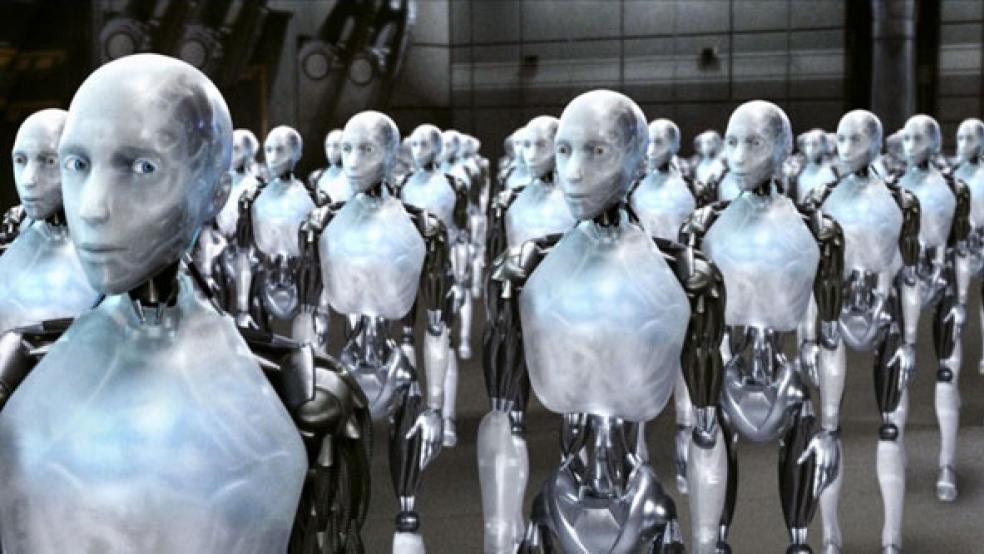For all the technological change Americans have witnessed in recent decades, from space travel to smartphones, we know much more is coming. And we’re only happy about some of it.
A study by the Pew Research Center released Thursday finds that while Americans are generally optimistic about science and technology in the long term, we’re more pessimistic about in the short term. The report culled data from a survey of 1,001 adults, with questions that attempted to get at the heart of attitudes toward closer-term advances — like bioengineering and robotics — and longer-term possibilities like space colonization and teleportation.
Per the study, 63 percent of Americans aren't happy about the idea of commercial or personal drones flying around over their heads. And 53 percent of respondents don't like the notion of wearing devices that stream information about the world around them. Only 20 percent of those polled find the idea of eating lab-grown meat palatable.
Related: Surprising Foods of the Future
Of course, these technological developments are all already here or on the very near horizon. At the end of last year, Amazon.com CEO Jeff Bezos floated the idea of using drones to deliver the online retail giant's packages. Bezos maintains he's serious about it, though the news was initially received with a great deal of skepticism and a few derisive laughs. But recent acquisitions of drone manufacturers by both Google and Facebook make it clear the prospect of a machine-filled sky is anything but a laughing matter for those concerned about it.
Related: Everything You Wanted to Know About Drones
A lab-grown hamburger has already been served to at least one adventurous taste tester in London, while most smartphone users seem eternally glued to their devices — capable of delivering as much news, weather data and social media goings on as the eyes can take.
Along these lines, 65 percent of Americans said they aren't looking forward to the possibility they may be cared for by personal robots in their dotage, but in Japan the government is already promoting the use of nursing care robots for the sick and elderly.
The Future Will Be Great, So Long as It Stays 'the Future'
Looking farther down the road, respondents turned much more optimistic and cheery about potential advances in science and technology.
"Overall, most Americans anticipate that the technological developments of the coming half-century will have a net positive impact on society," the study states. Nearly 60 percent “are optimistic that coming technological and scientific changes will make life in the future better,” Pew reports, while 30 percent "think these changes will lead to a future in which people are worse off than they are today."
Four out of five Americans surveyed think those in need of new organs will be able have them "custom grown" in a lab, while 51 percent of respondents think machines will be able to create art that is "indistinguishable from that produced by humans." (Though no one seems to have asked whether computers being able to produce art on par with Beethoven, Shakespeare or Picasso is a sign of progress or a sign of the apocalypse.)
Men in general are more optimistic than women about what science and technology has in store for the human race, while men with a college degree are even more so: Fully 79 percent of respondents in this group expect that technology will lead to a brighter future. And while you might expect older people to have a more pessimistic outlook on the long-term effects of science and technology than the young, both groups are equally positive about its potential effects.
The public does temper its long-term cheeriness with doubts about technology's limits. Only 39 percent of respondents believe that the ability to teleport objects — a la “Star Trek” — will happen, and just 33 percent think humans will colonize other planets in the given time frame. Being able to control the weather is given even worse odds by respondents, with a mere 19 percent rating that as likely.
On the one-part good news, one-part bad news front, Google will have to live with the fact that Americans are split almost evenly on the notion of driverless cars, though both California and Nevada have already approved the use of such vehicles. Google's driverless Prius and Lexus cars in general garner the most media attention in this space, though Audi and BMW are also part of the mix.
Finally, the possibility of owning a flying car, personal spacecraft, jet pack or hoverboard doesn't get much traction with Americans, with positive responses for each registering only in the single digits. Maybe most amusingly, when it comes to this kind of cutting-edge tech, the study reveals that most Americans are comfortable with someone else being the guinea pig.
Brain implants that may improve memory? Sounds like a neat idea. You go first.
Top Reads from The Fiscal Times:
- How to Squish the Heartbleed Bug and Keep Your Info Safe
- Top 5 Industries That Can Make You Fat
- Jamie Dimon’s Long To-Do List at JPMorgan Chase





